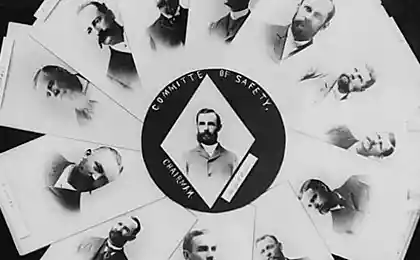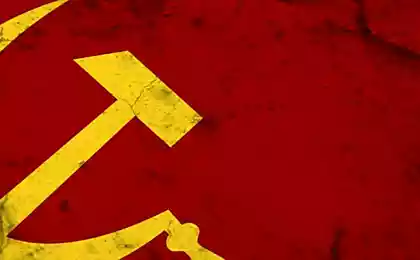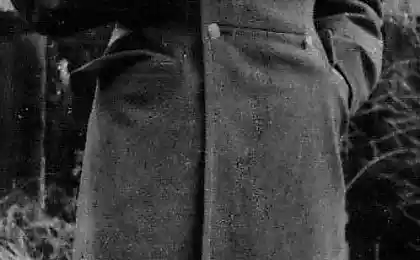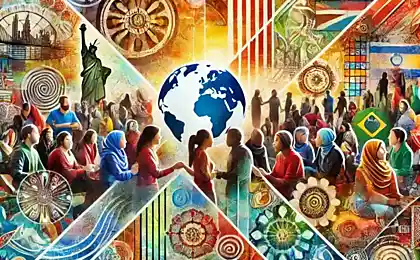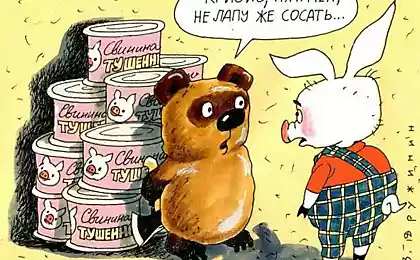574
How the economy makes us unhappy
What kind of man "makes for himself" a modern economy? Why this man is not only vulnerable to external shocks, but also psychologically, inwardly unstable? And what possibilities opens to us a frightening financial crisis?
Homo economicus and its psychologyEconomics — the essence and the nerve of our time, its a hot topic. Often counterpose it to the spirit as a field of purely material aspirations, market excitement and pragmatic accounting calculation. Indeed, homo economicus, "economic man", psychology, formed under the influence of the market — is in his numerous critical remarks. For the first time on the economization of humanity begin to pay attention in the nineteenth century, when increasing numbers of people who are involved in the intricate arrangements of productive and commercial relations.
Practicality, utilitarianism has always been present in human history. Goethe
That feeling is not far away for you;
What to take in hand not for you and there is no
I disagree with what you lie and a nonsense,
That you are weighed — nonsense read,
That is not minted — even if no price.
The miser Scrooge from "a Christmas story" and unscrupulous swindler Chichikov buys up dead souls; bankers and stockbrokers, full of greed, Balzac and Thackeray... Literature and philosophy to the best of my ability opposed to spreading wider and wider commercialization of life. Belinsky says: "Shopkeeper — being, life purpose which is profit, it is that the sea wave does not satisfy thirst, but only more annoying her. The shopkeeper may not have interests that are not related to his pocket."
Images careerists and money-grubbers are presented in a negative light, derided. Erich Fromm ironically draws the image of the "human goods" in the form of bags in the shop counter, which suddenly acquired the human ability to think and feel.
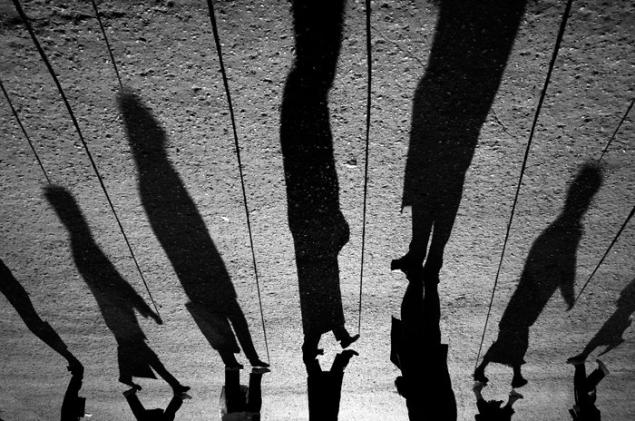
"Each bag, — writes the German philosopher, tried to be "more attractive" to attract buyers, and look as expensive as possible to obtain a price higher than its rival. Bag sold to the highest bidder, would feel chosen, as it would mean that she is the most "valuable" one; and that which has not been sold, would feel sad and would be imbued with a consciousness of their own unworthiness. Such a fate could fall out of the bag, which, despite its great view and convenience, had the misfortune to go out of fashion. Like the bag, the man must be in fashion on the personality market, and in order to be in fashion, he needs to know what kind of personality is in high demand. This knowledge is reported in General throughout the process of education, from kindergarten to College, and filled in the family."
Public didactics of the period of the Soviet Union based entirely on the motives of antimilitarism, critics of greed and social injustice. In the dystopian "dunno on the moon" presented allegorically, in the form of children's tales, Nikolai Nosov portrays a world completely subordinate to the market laws. First visit to the moon Shorty-earthlings had no idea about money, private property, debt interest, exchange and other things. Donut, comrade dunno journey, is one of the most stupid and lazy short people. Surprisingly, it's faster just adapts to lunar conditions. Donut finds that the lunar kitchen completely unfamiliar with seasoning in the form of salt. Demonstrating resourcefulness, Donut on the moon is knocked into a salt tycoon. He spends a carefree, idle life in pleasure and laugh at teammates who failed to grasp the benefits of commodity-money relations.
Half a century ago nosovskiy "dunno on the moon" read like a political cartoon.
But it will take a little time, and "time is money", "if you're so smart, why so poor" is the motto of capitalism, which is on the Russian soil. Of negative, comic characters duremara and donuts will be, if not heroes of a new time, it is quite commonplace.
Universal measure is money. "Don't applaud, just give me the money". Nothing strange, for example, to compare a painting and a pair of shoes. From the perspective of the market every item has its exchange value; multiple pairs of shoes may "equal" to one painting.
All that is not the subject of exchange, is treated as unnecessary, redundant, or easily purchased. One author vividly illustrates the philosophy of the monetary power: "How great is the power of money is so great and my strength. I'm ugly, but I can buy myself a beautiful woman. So, I'm not ugly, for the effect of ugliness, its repelling power, is driven by money..."
A new standard of relations generated by era in the development of the market, appears cold and detached. To successfully present themselves and sell their skills — the homo economicus sense of self defined by economic success, the price you give him. Drought overtakes the relationship of friends and family members. Still, in the market everyone is speaking for himself and busy with promotion of their own interests.
Progress and prosperity represented as a special law of the universe: the world is steadily moving to the times arranged; five gold, in the evening buried in the ground, in the morning just have to grow a tree, shining in all directions Golden rays. Come to prosperity and self-sufficiency — law, to remain among the poor — the exception to the rule. No special gifts and abilities when this is not required. The main thing — to learn where they pay more.
Over time the worldview of homo economicus finds increasing vulnerability, and the individualism and Mercantile calculation more difficult and hamper the development of social relations and institutions, negatively affecting in particular on economic growth. Modernity comes to a standstill, she desperately seeks a new solidarity. The crisis exacerbates the issue of humanitarian grounds of human activities in the areas of technology, trade and organization of production.
The dominant economic theory is questioned, actively rethinking. "The whole of modern "rational" organization, writes the philosopher and culture expert, Professor Alexander Panarin, is actually full of gaps, removal of conditions, activities, non-remunerated efforts. In other words, every social activity, every cooperation of people, along with the equivalent exchange requires disinterested advanced of confidence, not pre-prescribed initiatives, the spontaneous impulse of life, indomitable as nature itself".
Trust as an economic engine for theCredit — title the right column in the books, meaning literally: "he believes". Lending is of great importance to modern business. Surprisingly, the formal category of the world of money source is based on moral and humanitarian Foundation of trust to the borrower, to the person or organization originating under obligations for money borrowed.
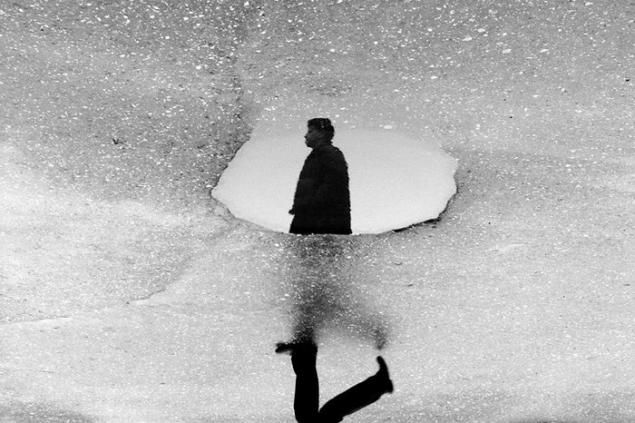
"We misunderstand the sources of wealth, says Matthew Stewart, author of "the Myth of management". — We think that they are the cause of technology or professional experience. But the main source is what we call trust. The willingness of people to trust each other in economic Affairs — that the most important source of wealth in modern society".
New is well forgotten old. Trust is the cement that holds the society, the laying of individual bricks. In a more dynamic view, trust is a function of the ratio of parts and whole. Interacting on the basis of trust, individuals and community form a system of higher order. "Unit" and "unit", connected together, give more than simple arithmetic duality.
Loss of confidence, by contrast, entails a decrease in quality, to the extent that "units" in a violent antagonism destroy each other. The American-Japanese political scientist and futurist Francis Fukuyama specifically examines the issue of trust as a fundamental principle for the political constructions. One of the books the author has the name "Trust: the social virtues and the path to prosperity". Brief summary: "the Prevalence of distrust in a society is equivalent to putting an additional tax on all forms of activity from which free society with a high level of trust."
In a globalizing world, the complexity of the economic and political relations makes people and countries more connected. If we were experts and high officials or represent itself from the profane, we are equally forced to delegate their trust into areas unknown to us personally.
"We do not know the driver of the train that were going, the captain and Navigator of the ship that are sailing, in most cases, we don't know of a doctor that not only consult, but to whom we trust our body and life surgery; it often happens that we don't know of a lawyer who commit to conduct our business, and especially a judge who decides in our or not in our favor.In all these cases we rely on what people who use our trust, 1) can and 2) want to help us," says German scientist-sociologist Ferdinand Tennis.
Broken trust becomes therefore a critical indicator of the symbol of the completion of the civilizational cycle. "Everything is owed to all" — this formula is often used in the description of the situation in connection with the financial and economic crisis, when debt obligations exceed the capacity payments. The debt crisis is, by and large, a crisis of confidence. A positive exit is associated, in fact, from a purely humanitarian factor — the ability to restore confidence.
Gift exchange instead ofthe Modern economy is a great accumulation of things and services that are in constant motion. Through the economic relations of mankind exchanged the results of their work. Historically, each person participated in commercial exchange in person, in a unique way and offered his own, is endowed with unique features of the product that gave the economic effect of the nature of the donation, laid the Foundation of mutual appreciation and respect, contributed to the open atmosphere in society. Exchange processes recently treated in the context of the global division of labor, anonymous and impersonal; essential workplace, not the employee; the human factor is gradually losing importance. The majority of workers in the labour market are not acting as people of service and duty, masters of their craft, and as a Supplement to formal institutional processes.
Gradually this leads to certain stagnation and impoverishment of the working energy. Once, at the beginning of the Enlightenment, the human will and energy was plenty of it, scarce was considered just the knowledge. In our days exactly the opposite: that knowledge and information is sufficient, then the will and energy constitute the primary public deficit.
Says Panarin: "the Old bourgeois order, using the people of the old school, effective at the average rate of return of 3-5%. The owner of the old type was up at 4 am, waking the household and set to work, not sparing forces and time. He stiffened, hardly constantly asking, and the cost of this tension, is it worth it to take if he gets to evening reward for the efforts made in the morning.
Oh, he was willing to wait! ... A new type of neurotic egotist, always fearful of how not to tell you not to do more than the other, capable only of short-term investments from today to tomorrow, and that under the guarantee of the highest profit. Constantly being in fear of something to pass, to make unnecessary, to invest without a return, this type is not so much acting, so much looking for those who in their simplicity would make for it."
Giving, personal relationship, professional life, business life and human concepts, without which it is unlikely that the living spirit was able to return to the economy and to provide her with a new round of development.
"Cosmic" forces,the crisis is also a crisis of urban life. Initially, as we know, the city drew energy from the village, which for the space of many generations the best, most energetic strength flowed to industrial urban soil. The archaic relationship with the world of the living, natural of the universe, the love of his land and to the natural circle phenomena was "space", the natural principle of health and inspiration. What will you do city now, in an era of doubt and alienation from the universal range of phenomena?
Megacities concluded its inhabitants in a circle of inanimate matter, severed the mysterious connection with the universe. Alexander Panarin, draws attention to a phenomenon called "secondary adaptation" as inner deafness and satiety, and disgust to any challenging work, a longing otmuchennoj from the world encountered by citizens of the third and subsequent generations. This is reminiscent of the images of "superfluous men" of Russian literature of the XIX century. Technical civilization has long coveted and demanded by a clear action for the user. Now she was stung by the costs of technocratic rationalism — the diverse manifestations of "mechanization" of man.
At the base of the crisis of the economy and national sovereignty lies the identity crisis. Maladjusted society is fragile, the level of resistance is low, whereas the need for guardianship is huge. At the elementary level the crisis is summed up of millions of "crisis cell" — individual beings, lost his footing in the primary natural experience.
Under the influence of crisis there is a greater risk of a civilized state to sink to a new barbarism. "Now, when civilization is threatened by degeneration, says Panarin — essakane socio-cultural base of the economy, devoid of inflow real live people of native gift, it's time to look to the former type of productive person and to unravel the sources of its life-giving energy."
The economy outside of the economy, Not all of what constitutes the welfare of society, is directly related to the pragmatic economic calculation. A significant proportion of humanity creates values in the areas of culture, education, privacy, charity. Aggregate social wealth is broader than the capital of banks, trade and industry. Having considered the human life as a whole, outside the framework of economization, we find, for example, that the infamous "career" does not have any qualitative differences or advantages over the activities of Housewives.
Children and home is, if you want, also career, long-term strategy and investment that has tangible material embodiment in the future.
More recently, a generation or two ago, the human life was in a totally different emotional direction. Lovely heart memories bring us back to the situation a tiny grandmother's room with flowers in pots and statues, where everything, in spite of their poverty, breathes order and thoroughness. Lace doilies holiday table from pickles own cooking. The taste of tea and cake with fragrant jam. And — a leisurely conversation about life, about the main thing.
Gravity, not abolishing quickness, a sense of dignity without look over their heads... Us, how would aliens from other worlds, atomized and always somewhere racing, it is difficult to imagine that under one shelter could coexist several generations or to the sitter, growing children, remained to live in the house on the rights of the family member, take time to settle and run away in search of the next best deals.
The reason is simple: the lifestyle of the generation of our grandparents was not economisirea. They were zealous in the framework of the customs of their era, but they did not occur to continuously calculate the efficiency, reasons and benefits, constantly anxious, as if not to be considered marginal.
They were generous soul, created, relying on their own skills, proven techniques and not on migrant workers, IKEA catalog and services, guided by the call of the soul and absolute devotion. Despite the fact that the work in the productive economy was in their lives a lot of space and absorb a lot of energy.
"From one-half to two-thirds of the total social product does not take into account any economic statistics, provides free work at home women. Women's gift to society is one of the most important the production of social and human capital. Social capital that builds from generation to generation does not take into account unpaid family labour women, is the capital of trust, which then, throughout adult life, had advanced any of his professional and social activities.
For many centuries the woman was carrying his selfless gift to the family in the form of tireless care, tireless compassion, helpful and loving attention given to husbands, children, fathers and brothers. Fed and groomed by caring female hands, and they went to work, nothing to think of but how much would it cost in the case of presentation of an invoice? Never thought about it and society itself, "free" exploiting the authoritarian-Patriarchal morality and the traditional sacrifice of those who followed this old-fashioned morality" (A. Panarin).
The crisis is most painfully hits the perception and way of life economic. It is a crisis of consumer perception, which primarily destroys the self-sufficiency of those who are accustomed to measure everything with money. On the contrary, the qualities of simplicity and naturalness, non-economic skills become more in demand.
The contribution of the teachers engaged in the education of new generations, social worker and volunteers engaged in the care of the sick and the elderly, priest-shepherd and the monks are not in the least inferior to, and, may be, exceeds the value of the success of the media presented images of entrepreneurs and managers. The more that non-economic relations to a greater extent inherent in the energy of the gift and the less manifested the decline of the living spirit.
Education type of character, ready to gift, is closely associated with native land and nature, consciously accepting the uncomfortable conditions and the risk relationship is positive for society, all of us in the near future.published
Author: Andrew Rogozinski
P. S. And remember, just changing your mind — together we change the world! ©
Join us in Facebook , Vkontakte, Odnoklassniki
Source: foma.ru/kak-ekonomika-delaet-nas-neschastnyimi.html
Homo economicus and its psychologyEconomics — the essence and the nerve of our time, its a hot topic. Often counterpose it to the spirit as a field of purely material aspirations, market excitement and pragmatic accounting calculation. Indeed, homo economicus, "economic man", psychology, formed under the influence of the market — is in his numerous critical remarks. For the first time on the economization of humanity begin to pay attention in the nineteenth century, when increasing numbers of people who are involved in the intricate arrangements of productive and commercial relations.
Practicality, utilitarianism has always been present in human history. Goethe
That feeling is not far away for you;
What to take in hand not for you and there is no
I disagree with what you lie and a nonsense,
That you are weighed — nonsense read,
That is not minted — even if no price.
The miser Scrooge from "a Christmas story" and unscrupulous swindler Chichikov buys up dead souls; bankers and stockbrokers, full of greed, Balzac and Thackeray... Literature and philosophy to the best of my ability opposed to spreading wider and wider commercialization of life. Belinsky says: "Shopkeeper — being, life purpose which is profit, it is that the sea wave does not satisfy thirst, but only more annoying her. The shopkeeper may not have interests that are not related to his pocket."
Images careerists and money-grubbers are presented in a negative light, derided. Erich Fromm ironically draws the image of the "human goods" in the form of bags in the shop counter, which suddenly acquired the human ability to think and feel.

"Each bag, — writes the German philosopher, tried to be "more attractive" to attract buyers, and look as expensive as possible to obtain a price higher than its rival. Bag sold to the highest bidder, would feel chosen, as it would mean that she is the most "valuable" one; and that which has not been sold, would feel sad and would be imbued with a consciousness of their own unworthiness. Such a fate could fall out of the bag, which, despite its great view and convenience, had the misfortune to go out of fashion. Like the bag, the man must be in fashion on the personality market, and in order to be in fashion, he needs to know what kind of personality is in high demand. This knowledge is reported in General throughout the process of education, from kindergarten to College, and filled in the family."
Public didactics of the period of the Soviet Union based entirely on the motives of antimilitarism, critics of greed and social injustice. In the dystopian "dunno on the moon" presented allegorically, in the form of children's tales, Nikolai Nosov portrays a world completely subordinate to the market laws. First visit to the moon Shorty-earthlings had no idea about money, private property, debt interest, exchange and other things. Donut, comrade dunno journey, is one of the most stupid and lazy short people. Surprisingly, it's faster just adapts to lunar conditions. Donut finds that the lunar kitchen completely unfamiliar with seasoning in the form of salt. Demonstrating resourcefulness, Donut on the moon is knocked into a salt tycoon. He spends a carefree, idle life in pleasure and laugh at teammates who failed to grasp the benefits of commodity-money relations.
Half a century ago nosovskiy "dunno on the moon" read like a political cartoon.
But it will take a little time, and "time is money", "if you're so smart, why so poor" is the motto of capitalism, which is on the Russian soil. Of negative, comic characters duremara and donuts will be, if not heroes of a new time, it is quite commonplace.
Universal measure is money. "Don't applaud, just give me the money". Nothing strange, for example, to compare a painting and a pair of shoes. From the perspective of the market every item has its exchange value; multiple pairs of shoes may "equal" to one painting.
All that is not the subject of exchange, is treated as unnecessary, redundant, or easily purchased. One author vividly illustrates the philosophy of the monetary power: "How great is the power of money is so great and my strength. I'm ugly, but I can buy myself a beautiful woman. So, I'm not ugly, for the effect of ugliness, its repelling power, is driven by money..."
A new standard of relations generated by era in the development of the market, appears cold and detached. To successfully present themselves and sell their skills — the homo economicus sense of self defined by economic success, the price you give him. Drought overtakes the relationship of friends and family members. Still, in the market everyone is speaking for himself and busy with promotion of their own interests.
Progress and prosperity represented as a special law of the universe: the world is steadily moving to the times arranged; five gold, in the evening buried in the ground, in the morning just have to grow a tree, shining in all directions Golden rays. Come to prosperity and self-sufficiency — law, to remain among the poor — the exception to the rule. No special gifts and abilities when this is not required. The main thing — to learn where they pay more.
Over time the worldview of homo economicus finds increasing vulnerability, and the individualism and Mercantile calculation more difficult and hamper the development of social relations and institutions, negatively affecting in particular on economic growth. Modernity comes to a standstill, she desperately seeks a new solidarity. The crisis exacerbates the issue of humanitarian grounds of human activities in the areas of technology, trade and organization of production.
The dominant economic theory is questioned, actively rethinking. "The whole of modern "rational" organization, writes the philosopher and culture expert, Professor Alexander Panarin, is actually full of gaps, removal of conditions, activities, non-remunerated efforts. In other words, every social activity, every cooperation of people, along with the equivalent exchange requires disinterested advanced of confidence, not pre-prescribed initiatives, the spontaneous impulse of life, indomitable as nature itself".
Trust as an economic engine for theCredit — title the right column in the books, meaning literally: "he believes". Lending is of great importance to modern business. Surprisingly, the formal category of the world of money source is based on moral and humanitarian Foundation of trust to the borrower, to the person or organization originating under obligations for money borrowed.

"We misunderstand the sources of wealth, says Matthew Stewart, author of "the Myth of management". — We think that they are the cause of technology or professional experience. But the main source is what we call trust. The willingness of people to trust each other in economic Affairs — that the most important source of wealth in modern society".
New is well forgotten old. Trust is the cement that holds the society, the laying of individual bricks. In a more dynamic view, trust is a function of the ratio of parts and whole. Interacting on the basis of trust, individuals and community form a system of higher order. "Unit" and "unit", connected together, give more than simple arithmetic duality.
Loss of confidence, by contrast, entails a decrease in quality, to the extent that "units" in a violent antagonism destroy each other. The American-Japanese political scientist and futurist Francis Fukuyama specifically examines the issue of trust as a fundamental principle for the political constructions. One of the books the author has the name "Trust: the social virtues and the path to prosperity". Brief summary: "the Prevalence of distrust in a society is equivalent to putting an additional tax on all forms of activity from which free society with a high level of trust."
In a globalizing world, the complexity of the economic and political relations makes people and countries more connected. If we were experts and high officials or represent itself from the profane, we are equally forced to delegate their trust into areas unknown to us personally.
"We do not know the driver of the train that were going, the captain and Navigator of the ship that are sailing, in most cases, we don't know of a doctor that not only consult, but to whom we trust our body and life surgery; it often happens that we don't know of a lawyer who commit to conduct our business, and especially a judge who decides in our or not in our favor.In all these cases we rely on what people who use our trust, 1) can and 2) want to help us," says German scientist-sociologist Ferdinand Tennis.
Broken trust becomes therefore a critical indicator of the symbol of the completion of the civilizational cycle. "Everything is owed to all" — this formula is often used in the description of the situation in connection with the financial and economic crisis, when debt obligations exceed the capacity payments. The debt crisis is, by and large, a crisis of confidence. A positive exit is associated, in fact, from a purely humanitarian factor — the ability to restore confidence.
Gift exchange instead ofthe Modern economy is a great accumulation of things and services that are in constant motion. Through the economic relations of mankind exchanged the results of their work. Historically, each person participated in commercial exchange in person, in a unique way and offered his own, is endowed with unique features of the product that gave the economic effect of the nature of the donation, laid the Foundation of mutual appreciation and respect, contributed to the open atmosphere in society. Exchange processes recently treated in the context of the global division of labor, anonymous and impersonal; essential workplace, not the employee; the human factor is gradually losing importance. The majority of workers in the labour market are not acting as people of service and duty, masters of their craft, and as a Supplement to formal institutional processes.
Gradually this leads to certain stagnation and impoverishment of the working energy. Once, at the beginning of the Enlightenment, the human will and energy was plenty of it, scarce was considered just the knowledge. In our days exactly the opposite: that knowledge and information is sufficient, then the will and energy constitute the primary public deficit.
Says Panarin: "the Old bourgeois order, using the people of the old school, effective at the average rate of return of 3-5%. The owner of the old type was up at 4 am, waking the household and set to work, not sparing forces and time. He stiffened, hardly constantly asking, and the cost of this tension, is it worth it to take if he gets to evening reward for the efforts made in the morning.
Oh, he was willing to wait! ... A new type of neurotic egotist, always fearful of how not to tell you not to do more than the other, capable only of short-term investments from today to tomorrow, and that under the guarantee of the highest profit. Constantly being in fear of something to pass, to make unnecessary, to invest without a return, this type is not so much acting, so much looking for those who in their simplicity would make for it."
Giving, personal relationship, professional life, business life and human concepts, without which it is unlikely that the living spirit was able to return to the economy and to provide her with a new round of development.
"Cosmic" forces,the crisis is also a crisis of urban life. Initially, as we know, the city drew energy from the village, which for the space of many generations the best, most energetic strength flowed to industrial urban soil. The archaic relationship with the world of the living, natural of the universe, the love of his land and to the natural circle phenomena was "space", the natural principle of health and inspiration. What will you do city now, in an era of doubt and alienation from the universal range of phenomena?
Megacities concluded its inhabitants in a circle of inanimate matter, severed the mysterious connection with the universe. Alexander Panarin, draws attention to a phenomenon called "secondary adaptation" as inner deafness and satiety, and disgust to any challenging work, a longing otmuchennoj from the world encountered by citizens of the third and subsequent generations. This is reminiscent of the images of "superfluous men" of Russian literature of the XIX century. Technical civilization has long coveted and demanded by a clear action for the user. Now she was stung by the costs of technocratic rationalism — the diverse manifestations of "mechanization" of man.
At the base of the crisis of the economy and national sovereignty lies the identity crisis. Maladjusted society is fragile, the level of resistance is low, whereas the need for guardianship is huge. At the elementary level the crisis is summed up of millions of "crisis cell" — individual beings, lost his footing in the primary natural experience.
Under the influence of crisis there is a greater risk of a civilized state to sink to a new barbarism. "Now, when civilization is threatened by degeneration, says Panarin — essakane socio-cultural base of the economy, devoid of inflow real live people of native gift, it's time to look to the former type of productive person and to unravel the sources of its life-giving energy."
The economy outside of the economy, Not all of what constitutes the welfare of society, is directly related to the pragmatic economic calculation. A significant proportion of humanity creates values in the areas of culture, education, privacy, charity. Aggregate social wealth is broader than the capital of banks, trade and industry. Having considered the human life as a whole, outside the framework of economization, we find, for example, that the infamous "career" does not have any qualitative differences or advantages over the activities of Housewives.
Children and home is, if you want, also career, long-term strategy and investment that has tangible material embodiment in the future.
More recently, a generation or two ago, the human life was in a totally different emotional direction. Lovely heart memories bring us back to the situation a tiny grandmother's room with flowers in pots and statues, where everything, in spite of their poverty, breathes order and thoroughness. Lace doilies holiday table from pickles own cooking. The taste of tea and cake with fragrant jam. And — a leisurely conversation about life, about the main thing.
Gravity, not abolishing quickness, a sense of dignity without look over their heads... Us, how would aliens from other worlds, atomized and always somewhere racing, it is difficult to imagine that under one shelter could coexist several generations or to the sitter, growing children, remained to live in the house on the rights of the family member, take time to settle and run away in search of the next best deals.
The reason is simple: the lifestyle of the generation of our grandparents was not economisirea. They were zealous in the framework of the customs of their era, but they did not occur to continuously calculate the efficiency, reasons and benefits, constantly anxious, as if not to be considered marginal.
They were generous soul, created, relying on their own skills, proven techniques and not on migrant workers, IKEA catalog and services, guided by the call of the soul and absolute devotion. Despite the fact that the work in the productive economy was in their lives a lot of space and absorb a lot of energy.
"From one-half to two-thirds of the total social product does not take into account any economic statistics, provides free work at home women. Women's gift to society is one of the most important the production of social and human capital. Social capital that builds from generation to generation does not take into account unpaid family labour women, is the capital of trust, which then, throughout adult life, had advanced any of his professional and social activities.
For many centuries the woman was carrying his selfless gift to the family in the form of tireless care, tireless compassion, helpful and loving attention given to husbands, children, fathers and brothers. Fed and groomed by caring female hands, and they went to work, nothing to think of but how much would it cost in the case of presentation of an invoice? Never thought about it and society itself, "free" exploiting the authoritarian-Patriarchal morality and the traditional sacrifice of those who followed this old-fashioned morality" (A. Panarin).
The crisis is most painfully hits the perception and way of life economic. It is a crisis of consumer perception, which primarily destroys the self-sufficiency of those who are accustomed to measure everything with money. On the contrary, the qualities of simplicity and naturalness, non-economic skills become more in demand.
The contribution of the teachers engaged in the education of new generations, social worker and volunteers engaged in the care of the sick and the elderly, priest-shepherd and the monks are not in the least inferior to, and, may be, exceeds the value of the success of the media presented images of entrepreneurs and managers. The more that non-economic relations to a greater extent inherent in the energy of the gift and the less manifested the decline of the living spirit.
Education type of character, ready to gift, is closely associated with native land and nature, consciously accepting the uncomfortable conditions and the risk relationship is positive for society, all of us in the near future.published
Author: Andrew Rogozinski
P. S. And remember, just changing your mind — together we change the world! ©
Join us in Facebook , Vkontakte, Odnoklassniki
Source: foma.ru/kak-ekonomika-delaet-nas-neschastnyimi.html
Delicious ginger hot chocolate
Portrait of the ideal companion: what kind of wife do men want, what kind of husband do women want?








